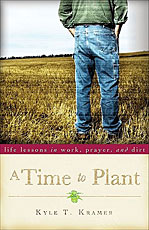In his debut book, Kyle Kramer hurrahs the joys of close contact with the earth, simplicity, organic farming, home, hospitality, and community. In 1999, he gave up his career as a private school teacher and purchased a block of land in southern Indiana to start a small farm. Kramer, now a columnist for America, also notes at the outset his decision to direct graduate lay ministry programs at Saint Meinrad Archabbey, a Benedictine monastery and school of theology. In the spirit of Scott Russell Sanders, one of his teachers, the author sets his goal as mining the meanings of "home economy" in terms of family, friends, neighbors, church, local. and international communities.
Kramer charts the difficulties of tilling the land, raising a pole barn, building a house, and dealing with nature's surprises. He learns the spiritual arts of patience and perseverance. Construction projects give the author a fresh sense of God working through community. Kramer's job at Saint Meinrad keeps the farm capitalized but doesn't allow him as much time to savor what he calls the healing work that good farming is.
All this work doesn't give him time to play, and he turns to his children to tutor him in improvisation, laughter, and fun. The author also praises the blessings that accrue from both hospitality and belonging. Both have given him a sense of inner wealth. Near the end of this paperback, Kramer writes about the time when Wendell Berry told him that hope is a discipline that must be developed in the midst of troubles, disappointments, and setbacks. He then concludes:
"And like love, I believe that the discipline of hope is a gift. On my own strength, I do not possess the virtue and willpower required to keep choosing hope, but through my relationship with others and with the Creation, I fancy that God keeps encouraging and empowering me to make that repeated choice."
